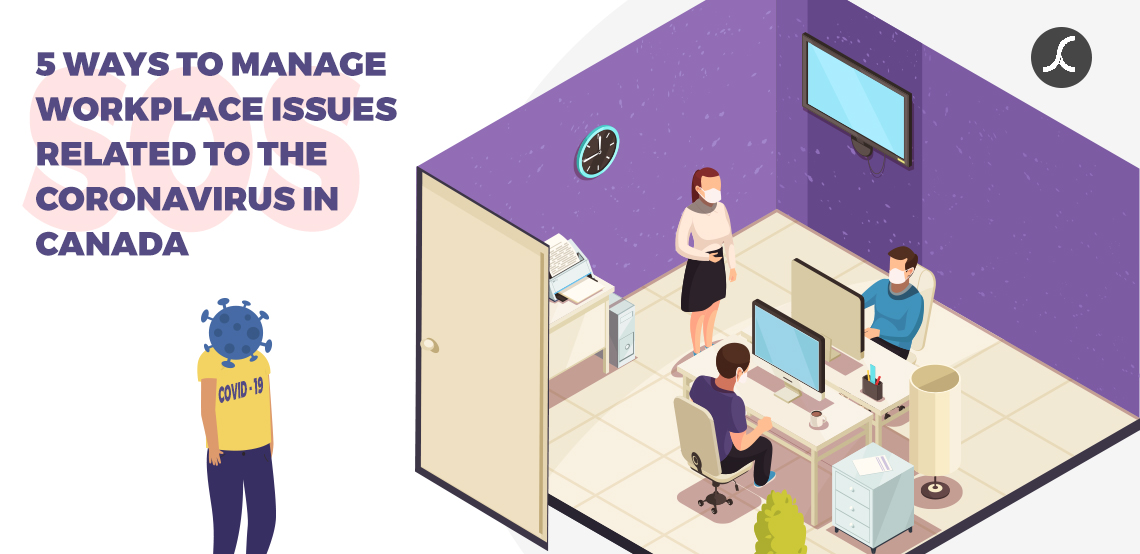How should Canadian businesses manage workplace issues related to coronavirus and respond legally?

5 years ago
Government organizations, private businesses, and every individual should combine and follow the strategies, policies, and procedures to control the coronavirus outbreak!
The coronavirus which isn’t as deadly as people think has now spread to around 157 countries with more than 160,000 positive cases. Though it is unable to cause a mass casualty like many other diseases, the ‘widespread’ coronavirus outbreak is resulting in supply chain disruptions and market uncertainty.

According to a report by the UN Conference on Trade and Development, the global economy may see an impact of $1-2 trillion due to coronavirus outbreak. The Royal Bank of Canada has also predicted that coronavirus will bring recession in the Canadian market and derail the Canadian economy.
This is indeed an unsettled situation for global businesses as well as Canadian businesses. Considering the aftermath of the coronavirus outbreak, it is not a rational idea for Canadian businesses and every worker working in Canadian workplaces to stay loose and hope that everything will be fine by tomorrow. Today is the best time to act against the coronavirus outbreak and to not regret later!
In this blog, we will discuss how Canadian businesses should respond to the coronavirus outbreak while obeying all government rules. But before that, let’s quickly study how big companies are taking on the coronavirus outbreak.
Significant efforts made by top companies to rescue humanity from coronavirus
- The co-founder of Alibaba Jack Ma has announced to donate 500,000 test kits and one million face masks.

- Eric Yuan who is the CEO of Zoom announced that his video conferencing platform, Zoom, would be available for free to K-12 schools in Japan, Italy, and the USA after a massive increase in download numbers as many businesses and schools are attempting to adapt to working and learning remotely.
- Bill Gates has also announced that the Bill & Melinda Gates Foundation, Wellcome, and Mastercard will team up to fund $125 million.
- Facebook has announced to donate $20 million to support relief efforts.
- Apple announced a similar $15 million in donations.
- Internet service providers like AT&T, Charter, CenturyLink, Comcast, T-Mobile, Verizon, Sprint, and Cox have also promised not to overcharge, charge late fees or terminate service.
Not only this, many other large enterprises and even SMEs have also given rise to relief steps to facilitate their users as well as their employees to deal with coronavirus outbreak and market uncertainty. Let’s now discuss what are the Canadian companies’ obligations around coronavirus outbreak and ways to manage workplace issues related to the coronavirus in Canada.
5 legal and effective ways to manage workplace issues related to the coronavirus in Canada
Though the Public Health Agency of Canada (PHAC) assesses the overall health risk of coronavirus to Canadians as ‘low’, Canadian businesses should start working on available options and solutions to manage workplace issues related to coronavirus.
The following are the 5 crucial steps you as the employer should consider to not let coronavirus influence your workforce and productivity hours, negatively.
Spread awareness
As of now, awareness is one of the most effective ways we have to control the coronavirus outbreak. You as the employer should always keep your employees informed with the latest development of the coronavirus.
For that, you first need to identify the authoritative sources of public health guidance on the coronavirus. The Centers for Disease Control and Prevention, The World Health Organization, The European Center for Disease Prevention and Control are the top trusted sources. To get all the latest updates of Canada on coronavirus, you can visit this official website of the Canadian government.
Trustworthy information from these official sources serves as the foundation for your company decisions about health and legal risk mitigation. You should align company policy with the official recommendations.
Put extra emphasis on hygiene and communication
After giving the right information on coronavirus to your employees, you should provide them with the means to act on that information. Canadian businesses should educate their employees about the modes of transmission, symptoms, and ways to ensure personal hygiene while working in the workplace.
To enable employees to ensure personal hygiene while working in the workplace, it is the obligation of the employers to make sure that employees have easy access to hand wash facilities or hand sanitizers.
Employers should also disinfect public surfaces such as counters, doorknobs, and elevator buttons regularly. Moreover, the Canadian employers should instruct employees to inform management if they have been exposed to the coronavirus or they have any vulnerabilities like the weekend immune system. Guests who come to your workplace and show symptoms should also be excluded from the workplace.
Impose business travel restriction but do not limit the personal travel
The Canadian government does not consider imposing business travel restrictions as illegal business practices. However, any efforts to limit personal travel would likely be considered an unjustified imposition on employees’ privacy.
Here, you can read the travel advisory published by the government of Canada. It includes that the overall risk to Canadian travellers is low, but it largely depends on the destination. Thus, Canadian business travellers should not only consider the travel advisory published by the government of Canada but should also consider the travel advisory published by the county where they are travelling.
Respect human rights and do not behave differently with infected employee
The human rights act of Canada concludes that it is not acceptable to behave differently with the infected employee based on his place of origin, citizenship, ethnic origin and ancestry. An employee also has the right to file a complaint against the employer for differential treatment.
Not only this, but under the health and safety (OHS) legislation, employees do have the right to work in a safe and healthy work environment, to know about the potential hazards, to participate in identifying and resolving workplace health & safety concerns, and to refuse unsafe work.
Do not force employees to stay home, but promote work-from-home policy
Employers can legally ask employees to self-isolate and stay home, particularly when an employee has travelled from a highly affected country or region or living with an infected person.
However, asking employees to stay at home can affect the productivity and delivery speed of your company’s service or products dramatically. Thus, rather than forcing employees to stay home, implement and promote the work-from-home policy. It not only helps you keep running your business at the same pace but also helps employees to keep themselves safe and productive during coronavirus outbreak.
However, to support remote work like big tech companies, you should set up the proper reliable, and secure IT infrastructure. Read our dedicated blog to know ways to set up IT infrastructure to support remote work.
In the nutshell:
This is undoubtedly a challenging time for governments, individuals, and businesses. And considering the fact that coronavirus vaccine won’t be market-ready before Christmas 2020, we should make ourselves, our businesses, our employees, and our family members prepare to lock horns with the worst time.
Talking about Canadian businesses, they are facing a lot of problems to run their day-to-day operations amid the coronavirus outbreak. However, there are some steps the government has already suggested to not suffer much. In this blog, we have shared those same steps.
By implementing these steps at your workplace, you can significantly reduce the business as well as health risks. These steps are also crucial because these steps will keep your business away from the legal trap.
You can schedule a one-on-one meeting with our Business Expert and IT Infrastructure Engineer to know more about ways to manage workplace issues related to coronavirus or to set up the IT infrastructure to support remote work or to address any other IT need.

